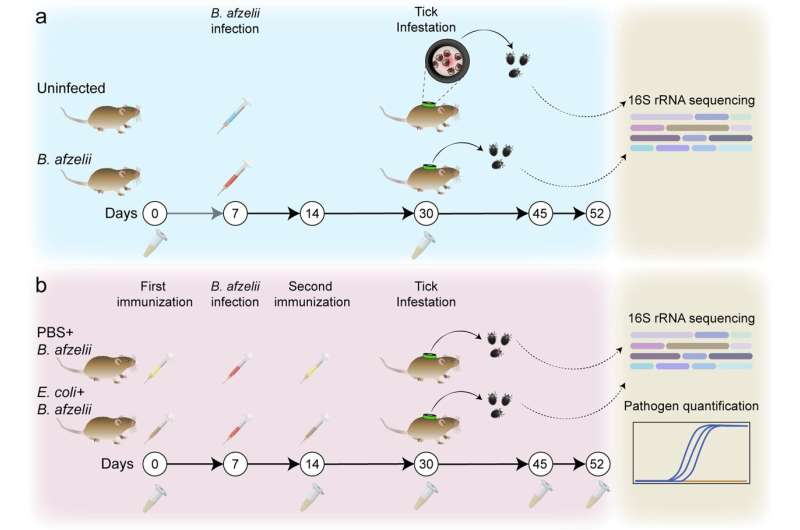August 2, 2023 report
This article has been reviewed according to Science X's editorial process and policies. Editors have highlighted the following attributes while ensuring the content's credibility:
fact-checked
peer-reviewed publication
trusted source
proofread
A vaccine that reduces ability of ticks to transmit Lyme disease bacteria

A team of medical scientists at Laboratoire de Santé Animale, working with colleagues from the Czech Academy of Sciences, the Nature Research Centre and the University of Guelph, has developed a type of vaccine meant to reduce the ability of ticks to transmit the bacteria that cause Lyme disease. In their paper published in the journal Microbiome, the group describes their approach to reducing the threat of Lyme disease by reducing the ability of ticks to host the bacteria behind the disease.
As scientists continue to look for a vaccine to prevent people from being infected with Borrelia afzelii, Borrelia burgdorferi and Borrelia mayonii, bacteria that causes Lyme disease, others look for new ways to reduce the threat to a given populace. In this new effort, the researchers have developed a vaccine that can be given to a host animal that prevents ticks from spreading the disease.
The work by the team involved first engineering a harmless type of bacteria that causes an antibody response in a host, such as a person or a mouse. The type of antibody produced was designed to force changes to the microbiota of a tick, making it inhospitable to hosting the bacteria that cause Lyme disease.
The modified bacteria, in the form of a vaccine, was then injected into a test mouse resulting in a harmless infection. When a tick pierced the skin of the test mouse, the antibodies were transferred to the tick, which prevented it from hosting the harmful bacteria, thus preventing it from infecting anyone else.
Notably, if people, livestock or even pets were given such a vaccination, they would not be protected against Lyme disease, instead, they would be serving as a means for preventing others from being infected by reducing the number of infected ticks. The idea behind the approach is that if enough people, livestock and pets are vaccinated, the number of ticks in a given area carrying Lyme disease causing bacteria would be diminished, protecting the human populace as a whole.
The researchers suggest such a vaccine could prove to be an effective means for reducing Lyme disease in areas where there are very high numbers of infected ticks.
More information: Alejandra Wu-Chuang et al, Microbiota perturbation by anti-microbiota vaccine reduces the colonization of Borrelia afzelii in Ixodes ricinus, Microbiome (2023). DOI: 10.1186/s40168-023-01599-7
© 2023 Science X Network




















